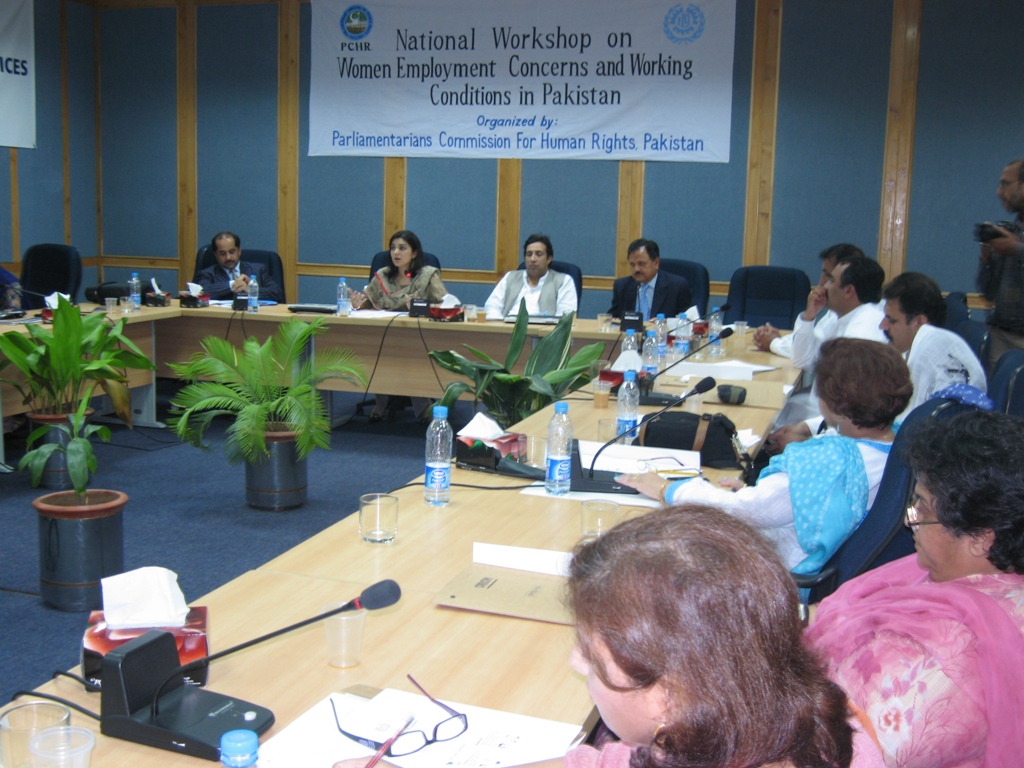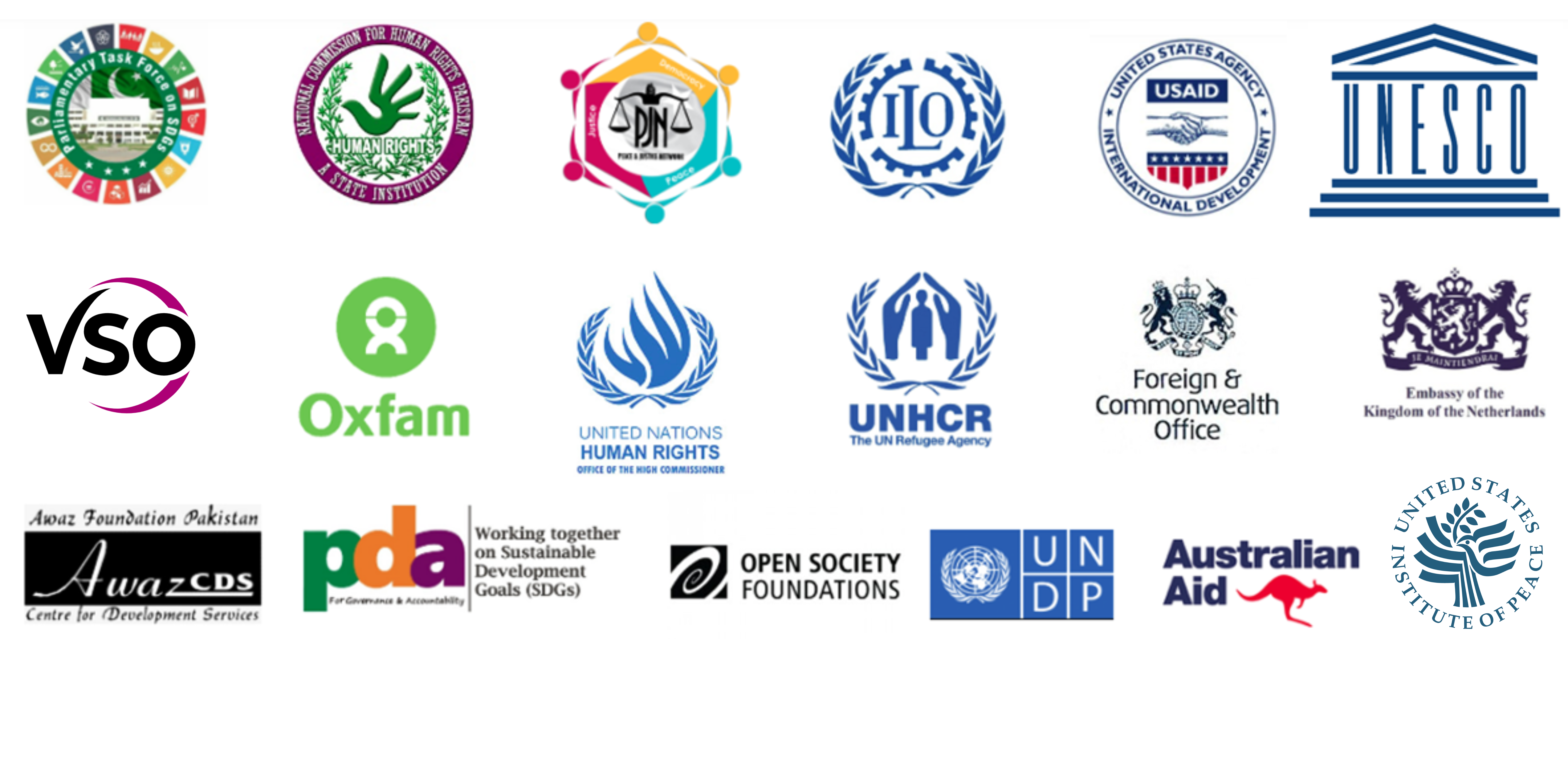About
MAKING THE WORLD A BETTER PLACE FOR ALL OF US
Our Story
The Parliamentarians Commission for Human Rights (PCHR) is a voluntary organization comprising members of Pakistani Parliament from all the major political parties and four provinces of Pakistan. These Parliamentarians have joined their hands together for the sole aim of protection and promotion of Human Rights through the parliament. The Commission’s understanding of Human Rights is based upon the Universal Declaration of Human Rights and other principal Human Rights instruments. We believe that, by and large, this internationally recognized framework of Human Rights is fully compatible with Islam and the Muslims have indeed a religious duty to strive for a just society, where rights of all citizens, Muslim and non-Muslim alike, are guaranteed.

The Commission believes that the Parliamentarians have a particular responsibility to use their position as public representatives to help in the attainment of those rights that have too long been denied to our people. Members of the Commission are promoting Human Rights in all aspects of their role as Parliamentarians, whether in leading public debate, in making and amending legislation or in scrutinizing the performance of public bodies. In the arena of Human Rights, Commission is facing a multidimensional challenging situation in Pakistan, which involves almost all legal, social, economic and cultural aspects of Human life. The Commission intends to be extremely vigilant and responsive to the complaints pertaining to all these aspects of Human Rights.
The commission also recognizes the valuable contribution that is being made by numerous organizations and individuals, in public as well as private sectors, in the field of Human Rights. It wishes to ensure that the Parliamentarians use their distinctive role to complement and strengthen the work of Human Rights activists throughout the country.
In order to achieve its stated aims and objectivesPCHR operates in the following ways:
- Using Parliamentary practices such as questions, call attention notices, adjournment motions and resolutions, to draw Government’s attention to Human Rights issues.
- Enhancing legislation for the protection of Human Rights, by presenting private member bills, suggesting amendments and participating in the drafting of bills and in Parliamentary debates.
- Conducting consultation with national and international experts and organizations to ensure that the parliamentarians are guided by all available expertise in the area of Human Rights.
- Operating a citizens complaint cell where the parliamentarians themselves receive and respond to people’s complaints of rights violations.
- Conducting research on various Human Rights issues and documenting the same.
- Holding the Government organizations accountable for the grievances for which they may be responsible.
- Participating in the security of public institutions with Human Rights responsibilities such as prison, police etc.
- Conducting on the spot investigations of Human Rights violations and publishing the results.
- Publishing reports on all aspects of Human Rights and the Commission’s contribution towards their protection and promotion.
- Operating a secretariat to support all aspects of the Commission’s work.
- Laising with the relevant regional and international organizations.
Pchr And Its Priority Areas
The Parliamentarians Commission for Human Rights (PCHR) is an independent non-profit and non-governmental organization registered under Trust act,1882 and comprising members of Pakistani Parliament from all the major political parties and four provinces of Pakistan. These Parliamentarians have joined their hands together for the sole aim of protection and promotion of Human Rights through the parliament. The Commission’s understanding of Human Rights is based upon the Universal Declaration of Human Rights (UDHR) and other principal Human Rights instruments. We believe that, by and large, this internationally recognized framework of Human Rights is fully compatible with Islam and the Muslims have indeed a religious duty to strive for a just society, where rights of all citizens, Muslim and non-Muslim alike, are guaranteed.
Legislatures represent masses, shape laws and exercise a degree of oversight or control over executive and hence can function or perform as best governing partners and thus contribute to good government by increasing its capacity to monitor and respond to public needs, by playing a part in passing legislation capable of withstanding critical scrutiny, and serving as a vehicle for improving standard of probity, efficiency, and responsiveness in the administration of laws.
Pakistan unfortunately has a mix history of democratic and authoritarian governments. Democracy has never found strong footholds in our institutions. National Assembly, being the country’s highest legislative institution has seen frequent ups and downs in a short history of half a century. Pakistan’s record of parliamentary democracy may be checkered but its return to this form after each pause and break more than vindicates the fact that democratic tradition are deep – rooted in Pakistan’s polity.
Our Parliament does not always receive sufficient information and sometimes does not determine questions that are important for the country, such as military budgets or structural adjustment programmes. Some of our parliamentary members have their roots and/or affiliations in the Feudal class. Unfortunately, (though a few one) those members want to maintain the status quo or are unaware and have a disregard for the human rights violations. Some conservatives oppose human rights promotion just because they prefer and takepride in their traditional practices vis-a-vis human rights standards as in the care of honor killings.
In Pakistan, the human rights voices in the Parliament have been heard only recently, especially with the efforts of members of Parliamentarians commission for Human Rights. Keeping in view the low literacy rate in Pakistan, it was no surprise that majority of parliamentarians in the past had a limited knowledge especially in the field of human rights. However, the new parliament has a whole lot of able men and women who can make a difference. They are well educated and are well aware of the human rights conditions prevailing in the country. This is evident from the fact that they raised different human rights issues in the parliament and for that they organised themselves as Parliamentarians Commission for Human Rights.
We believe that this commission has a unique opportunity to breathe life into Pakistan’s democracy by taking up human rights issues. The challenge that members of the commission has accepted is to demonstrate that Parliament can indeed, practically protect the rights of its citizens and make a significant positive difference in the society. By pushing human rights to the centre of the parliamentary agenda, we hope to contribute to restoration of faith in parliamentary democracy as the effective safeguard of Human rights.
The Commission believes that the Parliamentarians have a particular responsibility to use their position as public representatives to help in the attainment of those rights that have too long been denied to our people. Members of the Commission are promoting Human Rights in all aspects of their role as Parliamentarians, whether in leading public debate, in making and amending legislation or in scrutinizing the performance of public bodies. In the arena of Human Rights, Commission is facing a multidimensional challenging situation in Pakistan, which involves almost all legal, social, economic and cultural aspects of Human life. The Commission intends to be extremely vigilant and responsive to the complaints pertaining to all these aspects of Human Rights. In order to be effective, however, it has decided to launch its initiatives initially in the following priority areas.
We are conscious of the significance of the cross-party nature of our commission. A functional democracy depends upon the existence of credible, competing, political parties that can advocate alternative policies and hold each other to account. But promotion of Human rights is an area in which there is scope for cross-party co-operation. For example, in the Westminster system, the Human Rights Committee includes members from treasury and opposition and is specifically charged with reviewing legislation to identify arbitrary powers or potential for undermining of fundamental rights. The committee’s mandate is to stand back from the government’s political objectives in proposing any law, and consider only human rights implications. This is an attractive model for Pakistan’s parliamentary development, a way to combine principled co-operation on rights, with legitimate political opposition on policy.
The commission also recognizes the valuable contribution that is being made by numerous organizations and individuals, in public as well as private sectors, in the field of Human Rights. It wishes to ensure that the Parliamentarians use their distinctive role to complement and strengthen the work of Human Rights activists throughout the country.
With Your Help We are Making The World a Better Place
“Mobilizing Parliamentarians to make them effective defenders of human rights working along side local, national, regional and international human rights organizations and institutions engaged at all level of Pakistani society”

Our Mission & Approach
Human rights are rights inherent to all human beings, whatever our nationality, place of residence, sex, national or ethnic origin, colour, religion, language, or any other status. We are all equally entitled to our human rights without discrimination. These rights are all interrelated, interdependent and indivisible.
Universal human rights are often expressed and guaranteed by law, in the forms of treaties, customary international law , general principles and other sources of international law. International human rights law lays down obligations of Governments to act in certain ways or to refrain from certain acts, in order to promote and protect human rights and fundamental freedoms of individuals or groups.
Our Partners

